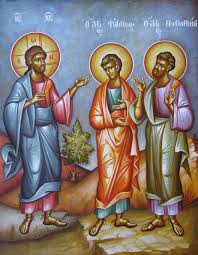HOMILY JANUARY 04 – Year II
Come, See and Be
(1 Jn 3:7-10; Ps 98; Jn 1:35-42)
*********************************
There is a freshness to the gospel today that, along with the first reading, invites us to “come, see and be” – to come to Jesus, discover who Jesus is, and respond by being Christ-like or righteous.
John the Baptist is the one who first points Jesus out to his own disciples, who then turn to follow Jesus. He asks them (and us) a key question – “What are you looking for?” That strikes at the heart of every one of our lives – what ultimately, are we looking for out of life? Why are we here? What is our purpose, our goal? The implication, of course, is that Jesus must be the centre of my life.
 The response of John’s disciples is a most appropriate one – “Rabbi, where are you staying?” Where indeed is God in our lives? Where does Jesus stay, for us in all of our affairs. The response by Jesus to “come and see” is an invitation into a relationship with him. Try to imagine what it was like for these disciples to actually go to Jesus’ dwelling place, to see him at home, to sit and visit with him around the table. What would it be like for you or me to be there? How would we feel? What would we ask him? What would we tell him about ourselves? He would be our host, perhaps offering us a cup of tea! How would we respond?
The response of John’s disciples is a most appropriate one – “Rabbi, where are you staying?” Where indeed is God in our lives? Where does Jesus stay, for us in all of our affairs. The response by Jesus to “come and see” is an invitation into a relationship with him. Try to imagine what it was like for these disciples to actually go to Jesus’ dwelling place, to see him at home, to sit and visit with him around the table. What would it be like for you or me to be there? How would we feel? What would we ask him? What would we tell him about ourselves? He would be our host, perhaps offering us a cup of tea! How would we respond?
John the Baptist, and later, Andrew, help us to see who Jesus is. For John, he is the Lamb of God – alluding to a long tradition in Judaism of first of all the Passover Lamb sacrificed to celebrate their liberation from slavery in Egypt, then to the ritual of pinning all their sins on a scapegoat driven into the desert to ritually cleanse themselves of their sins. Jesus is the true Paschal Lamb who truly frees us from slavery to sin, and the true scapegoat who really takes away the sins of the world.
Inspired surely by the Holy Spirit, Andrew finds his brother to boldly claim that they had found the long-awaited Messiah, the one who would both redeem and sanctify Israel, who would forgive all their sins, and heal all their sinfulness, that which made them sin in the first place – all their painful emotions and negative attitudes.
The evangelist John, in the first reading, informs us on how we are to be – we are to love first of all, and then do what is right – to be righteous and just. We know we are to love God, love others as we love ourselves, love as Jesus as loved us, and finally, to love even our enemies.
On top of that, we can imagine what Jesus might have called us had we been brought to him as Simon was, only to have his name changed by Jesus to Cephas or Peter, which meant “rock”. Actually, we need not imagine – to come to Jesus, to see and believe in him as Lamb of God and Messiah, makes us Christians – so we are to live up to that name and truly be as Christ-like as we can.
So, this gospel about the first encounter of the disciples with Jesus is a fitting one as we take the first steps into a new year, inviting us to come to Jesus, discover who he is, and respond to that encounter by following him as did Andrew, Peter and the others.
The Eucharist is the best way to celebrate our on-going encounter with this Jesus of Nazareth who is both Lamb of God and Messiah – who loves us by forgiving and healing us even as we celebrate his Word and receive his body and blood.
May we be empowered to keep fresh our relationship with Jesus, coming to him, seeing who he is and being like him in all we think, do and say.



